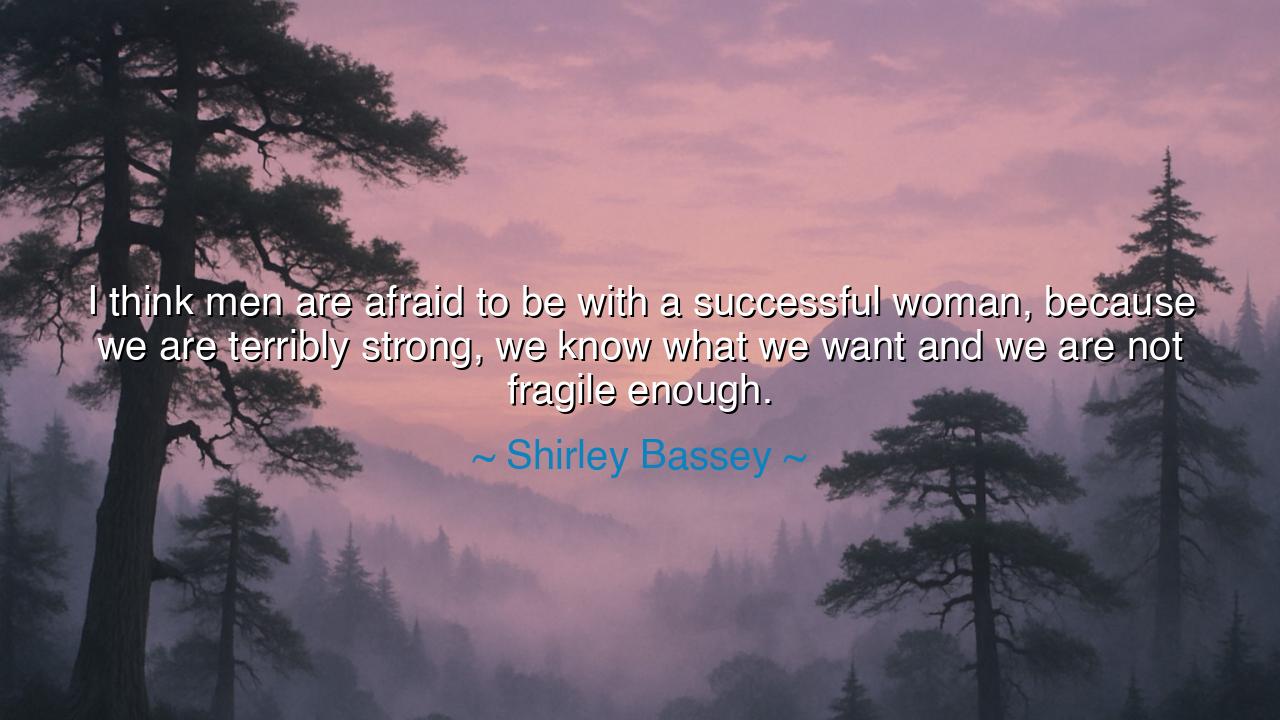
I think men are afraid to be with a successful woman, because we
I think men are afraid to be with a successful woman, because we are terribly strong, we know what we want and we are not fragile enough.






The words of Shirley Bassey blaze with both defiance and truth: “I think men are afraid to be with a successful woman, because we are terribly strong, we know what we want and we are not fragile enough.” In these words lies the cry of a woman who has walked through fire and emerged unbroken, a woman who knows that strength in women often unsettles the world. She declares that success, when worn by a woman, is not always crowned with admiration but often greeted with fear, for it challenges ancient expectations of fragility, obedience, and silence.
The origin of these words comes from Bassey’s own journey. Rising from poverty in Cardiff to become one of the greatest singers of her age, she carved her name into history through sheer talent and determination. Yet, even as her voice shook concert halls and her songs became immortal, she faced the prejudice reserved for strong women: whispers that she was too bold, too powerful, too unwilling to bend. Her quote is not a mere opinion—it is testimony born of a lifetime in which her success revealed both the admiration and the intimidation she inspired in men.
The ancients knew well this tension between strength and fear. In the myths of Greece, men praised the beauty of women, yet trembled before their power. Consider the figure of Atalanta, the swift huntress who would not wed any man unless he could outrun her. Many desired her, but most feared her, for her independence was a rebuke to their dominance. Similarly, the Amazons—warrior women—were both revered and dreaded, for they embodied the truth that a woman could be equal, even superior, in courage and resolve.
History also provides the luminous example of Cleopatra. She was not merely a queen of beauty, but of intellect and will. She ruled with cunning, diplomacy, and vision, bending even great men like Julius Caesar and Mark Antony into her orbit. Yet for centuries her name was painted in shadow, reduced to seduction and manipulation, as though the world could not admit that her true power lay not in fragility, but in strength. In her story, as in Bassey’s words, we see the same truth: that men may admire power in women, but many also fear it, for it unsettles the balance of control.
There is also an unspoken sorrow in Bassey’s declaration. For what she calls “terribly strong” is both blessing and burden. The successful woman stands tall, unbroken, yet often she must stand alone. The world honors her strength, but the cost is isolation, for those who would walk beside her sometimes shrink away. Yet her words are not bitter; they are proud. She reminds us that it is better to be strong and whole than fragile and dependent, even if that strength provokes fear.
The lesson for us is this: strength in women is not a threat, but a gift. Men must learn that to walk beside a successful woman is not to be diminished, but to be elevated, for her resolve, clarity, and courage can sharpen his own. And women must learn never to dim their light to soothe the fears of others. For the world is not healed by fragile masks, but by the union of strength with strength, love with equality.
Practical action lies within reach: women, embrace your power without apology. Speak your truth, pursue your vision, and never bow to fear of how others may see you. Men, examine your hearts and cast aside the ancient fear that equates strength in women with weakness in yourselves. Walk alongside them, not above or below, but as equals. Together, create bonds not of dominance and fragility, but of mutual respect and shared power.
So let Shirley Bassey’s words echo as a call to future generations: “Men are afraid of successful women, because we are terribly strong, we know what we want, and we are not fragile enough.” Let that strength no longer inspire fear, but admiration. Let it no longer cause isolation, but partnership. For when men and women alike embrace strength rather than fragility, the world will move closer to balance, and the bonds between them will be forged not in fear, but in enduring respect.






AAdministratorAdministrator
Welcome, honored guests. Please leave a comment, we will respond soon